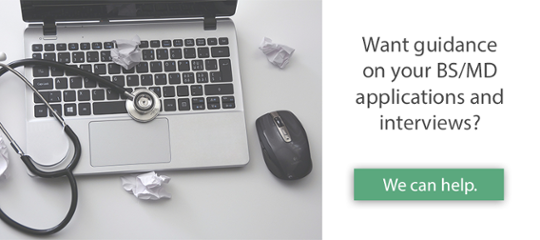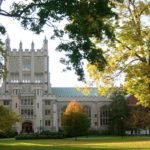How Important Is the BS/MD Interview?
For many college students, the undergraduate years are a time of testing the waters before settling on a potential career path. In fact, the National Center for Education Statistics estimates that as many as 80% of undergraduate students change their major at some point. Some students, though, settle on a career path much earlier.
If you’re a high school student who is fully committed to a career as a doctor, you may be considering a combined BS/MD program. These programs allow you to complete your undergraduate degree and then progress directly into med school. There is only one application process for the entire program, and you can sometimes complete your coursework at an accelerated pace, graduating with your MD earlier than had you done each degree separately.
Of course, these combined programs aren’t for everyone. While they may ultimately streamline the path to a medical degree, there are far fewer programs to choose from compared to a traditional med school, and they are extremely selective. The application process can be lengthy and intensive.
One way in which applying to a BS/MD program is different than applying to an undergraduate school as a premed student is the intensity of the interview process. To learn more about the application process for combined BS/MD programs and specifically the importance of the BS/MD interview, keep reading.
What Is the Procedure for Applying to BS/MD Programs?
The exact procedure for applying to BS/MD programs varies according to the school(s) to which you’re applying, but in general the format consists of an extensive application, which narrows the field to finalists, who are then invited to interview.
The BS/MD application usually includes your grades, test scores, teacher recommendations, and at least one essay. After your application is reviewed, some schools might request secondary information from students who pass the initial review. This isn’t always the case, but you may be asked for additional essays or long answer questions.
Once the applicant pool has been narrowed down to the finalists, these students will be invited for interviews, which is the final stage of BS/MD applications.

What is the format of the BS/MD interview?
There is no single prescribed format for the BS/MD program interview. Some of these interviews are similar in format to a traditional undergrad college interviews, taking place between one applicant and a panel of interviewers. Other interviews take place in large groups, and still others are a series of one-on-one interviews.
Some interviews will be completed in just an hour or so, while others will last in sequence for the entire day. Sometimes you will be interview by a professor, other times by a student or a doctor at the teaching hospital.
Some BS/MD candidates have even reported group activities or other exercises as a part of the process.
What Is the Goal of the BS/MD Interview?
By the time BS/MD candidates are invited for an interview, they have already been extensively screened. Most interviewees will represent the top of the applicant pool. They will have high test scores and GPAs. Their essays and recommendations will reflect their status as highly motivated students who have shown a commitment to service and STEM activities.
The goal of the BS/MD interview then becomes to lend insight into who you are as a person. Essentially, you need to convince the interview committee that you’re everything you sold yourself as on paper, and then some.
The BS/MD interview is not a test of knowledge. There will be few to no questions related specifically to the field of medicine. Most interviewees who have experienced questions related to the medical field report questions related to current events or opinions in the context of medicine. You should have some general knowledge about important issues in medicine today, but you don’t need to worry about being quizzed.
Instead, arrive prepared to explain why you want to become a doctor in a way that clearly highlights your dedication to serving others and your sincere interest in medicine.
How Competitive Are BS/MD Interviews?
Most BS/MD programs are more competitive than the most competitive colleges, including Ivy League schools. The precise level of competition will vary according to the school(s) you apply to, but in general only about 10% of all BS/MD candidates are invited to an interview. This means that just being invited to a BS/MD interview is an accomplishment in and of itself.
That said, an interview invitation is by no means a preliminary acceptance to the program. Fewer than half of all interviewees are ultimately accepted to BS/MD programs and at some schools the acceptance rate is closer to one in five interviewees.
The overall rate of acceptance at BS/MD programs is around 4%.
How Important Is the BS/MD Interview to the Admissions Process?
The interview is debatably the single most important part of the BS/MD program admissions process. If you are invited to an interview, you have already been identified as a top candidate in the applicant pool. While grades, test scores, and recommendations have earned you a place in the interview process, it will be your interview that ultimately decides whether or not you are accepted to the program.
In general, interview committees will select students who can most clearly communicate their commitment to the field of medicine, who can most convincingly describe their desire to help others, and who can back up their claims with evidence from their high school experiences. Having real-life experiences to draw on will be of particular importance, as they allow you to talk about your goals and how you’ve worked towards them in clear terms.
How Can I Prepare for the BS/MD Interview?
There are a few ways to prepare for this important interview. First, carefully plan your day ahead of time. Be sure to allow plenty of time to arrive for the interview promptly. Being late for this interview will almost certainly exclude you from succeeding.
Also think about what you will wear to appear polished yet feel comfortable. You will need something that shows you are serious about the program and respect the interview process, but if you’re uncomfortable, you may be distracted from the interview itself.
In addition, try to anticipate what questions you might be asked. While there’s no way to know for sure, some common questions include:
- Briefly introduce yourself, including your experiences and background.
- Why do you want to participate in a BS/MD program?
- Why do you want to attend this specific BS/MD program?
- Why do you want to become a doctor?
- Who has inspired you most?
- What experiences have you had in the field of medicine?
As you consider your interview responses, keep in mind that in general you should avoid the topics of politics and money. While these may be primary issues for you, your decisions as a medical doctor should never rely on your political leanings or earning considerations.
Finally, try to be yourself and project confidence. The interview committee will appreciate your authenticity.
It’s natural to feel intimidated by the BS/MD interview. There is a lot on the line, and your future as a BS/MD student hinges on it. While your application will provide the initial screening to ensure that you are academically qualified, your interview will provide the personal insight into your motivation and dedication, ensuring that you are personally a good fit for the program. The importance of the BS/MD interview cannot be overstated.
Curious about your chances of acceptance to your dream school? Our free chancing engine takes into account your GPA, test scores, extracurriculars, and other data to predict your odds of acceptance at over 500 colleges across the U.S. We’ll also let you know how you stack up against other applicants and how you can improve your profile. Sign up for your free CollegeVine account today to get started!
To learn more about BS/MD programs, read these popular CollegeVine posts:
- Timeline: Applying to BS/MD Programs
- BS/MD Programs vs PreMed: Which is Right For You?
- CollegeVine’s Top 25 Combined BS/MD Programs
- A Beginner’s Guide to 7-Year Med Programs
- How to Write 7-Year Med Program Essays
- How to Survive Your 7-Year Med Program Interview
- Summer Activities for the Prospective PreMed Student
- Are Combined Undergraduate/Graduate Programs Right For You?


